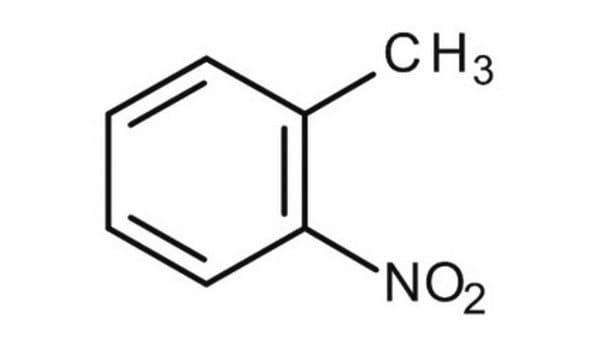N27306
2-Nitrotoluene
≥99%
Synonym(s):
1-Methyl-2-nitrobenzene
Sign Into View Organizational & Contract Pricing
All Photos(1)
About This Item
Linear Formula:
CH3C6H4NO2
CAS Number:
Molecular Weight:
137.14
Beilstein:
1907580
MDL number:
UNSPSC Code:
12352102
PubChem Substance ID:
Recommended Products
Assay
≥99%
refractive index
n20/D 1.546 (lit.)
bp
225 °C (lit.)
mp
−4-−3 °C (lit.)
density
1.163 g/mL at 25 °C (lit.)
SMILES string
Cc1ccccc1[N+]([O-])=O
InChI
1S/C7H7NO2/c1-6-4-2-3-5-7(6)8(9)10/h2-5H,1H3
InChI key
PLAZTCDQAHEYBI-UHFFFAOYSA-N
Looking for similar products? Visit Product Comparison Guide
Legal Information
DuPont product
replaced by
Product No.
Description
Pricing
Certificates of Analysis (COA)
Search for Certificates of Analysis (COA) by entering the products Lot/Batch Number. Lot and Batch Numbers can be found on a product’s label following the words ‘Lot’ or ‘Batch’.
Already Own This Product?
Find documentation for the products that you have recently purchased in the Document Library.
Sikandar I Mulla et al.
Biodegradation, 22(1), 95-102 (2010-06-29)
A bacterial consortium capable of degrading nitroaromatic compounds was isolated from pesticide-contaminated soil samples by selective enrichment on 2-nitrotoluene as a sole source of carbon and energy. The three different bacterial isolates obtained from bacterial consortium were identified as Bacillus
Homeira Ebrahimzadeh et al.
Talanta, 79(5), 1472-1477 (2009-07-29)
Dispersive liquid-liquid microextraction (DLLME) coupled with gas chromatography-flame ionization detector (GC-FID) was developed for preconcentration and determination of some nitroaromatic compounds in wastewater samples. The effects of different variables on the extraction efficiency were studied simultaneously using experimental design. The
Sikandar I Mulla et al.
Chemosphere, 90(6), 1920-1924 (2012-11-17)
Nitrotoluenes are the toxic pollutants of the environment because of their large scale use in the production of explosives. Biodegradation of such chemicals by microorganisms may provide an effective method for their detoxification. We have studied the degradation of 2-nitrotoluene
Ismael Cotte-Rodríguez et al.
The Analyst, 130(5), 679-686 (2005-04-27)
The use of two methods in tandem, single-sided membrane introduction mass spectrometry (SS-MIMS) and fiber introduction mass spectrometry (FIMS), is presented as a technique for field analysis. The combined SS-MIMS-FIMS technique was employed in both a modified commercial mass spectrometer
Akané E Hartenbach et al.
Environmental science & technology, 42(22), 8352-8359 (2008-12-17)
Compound-specific nitrogen isotope analysis was shown to be a promising tool for the quantitative assessment of abiotic reduction of nitroaromatic contaminants (NACs) under anoxic conditions. To assess the magnitude and variability of 15N fractionation for reactions with dissolved reductants, we
Our team of scientists has experience in all areas of research including Life Science, Material Science, Chemical Synthesis, Chromatography, Analytical and many others.
Contact Technical Service








